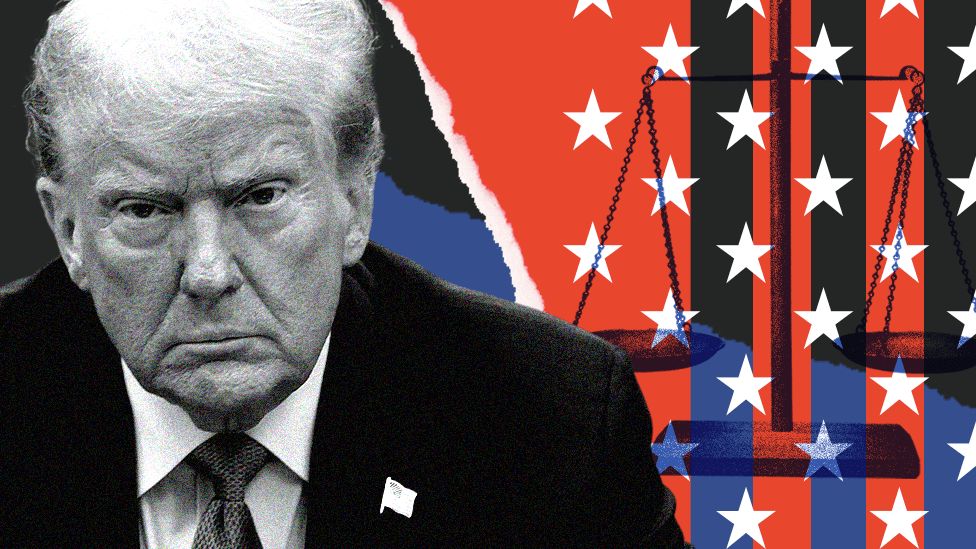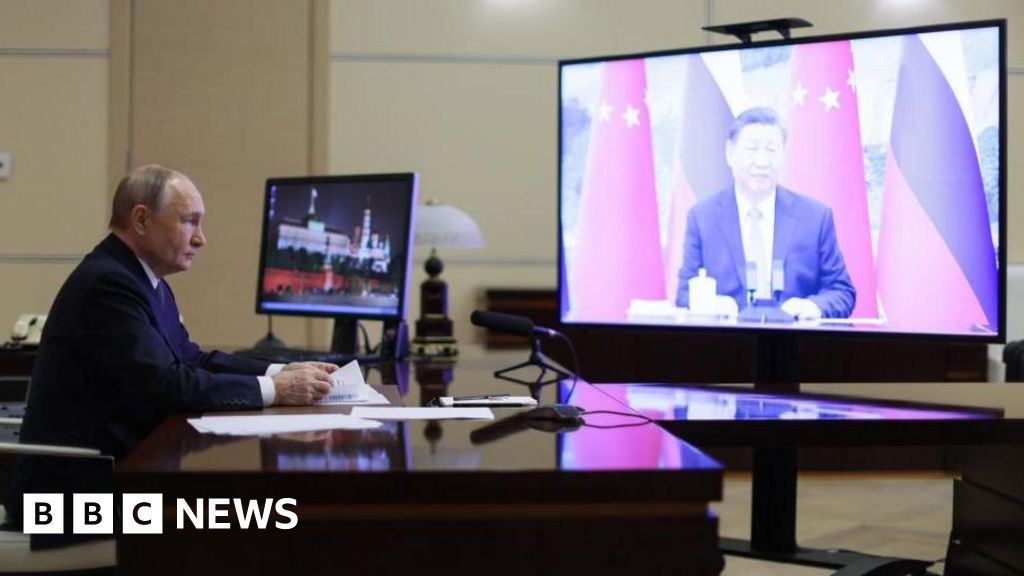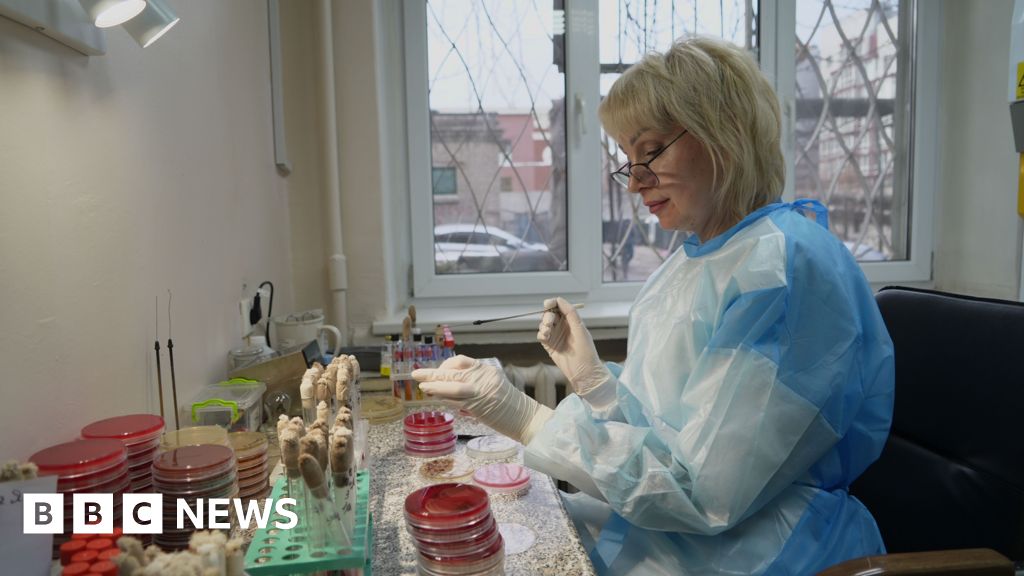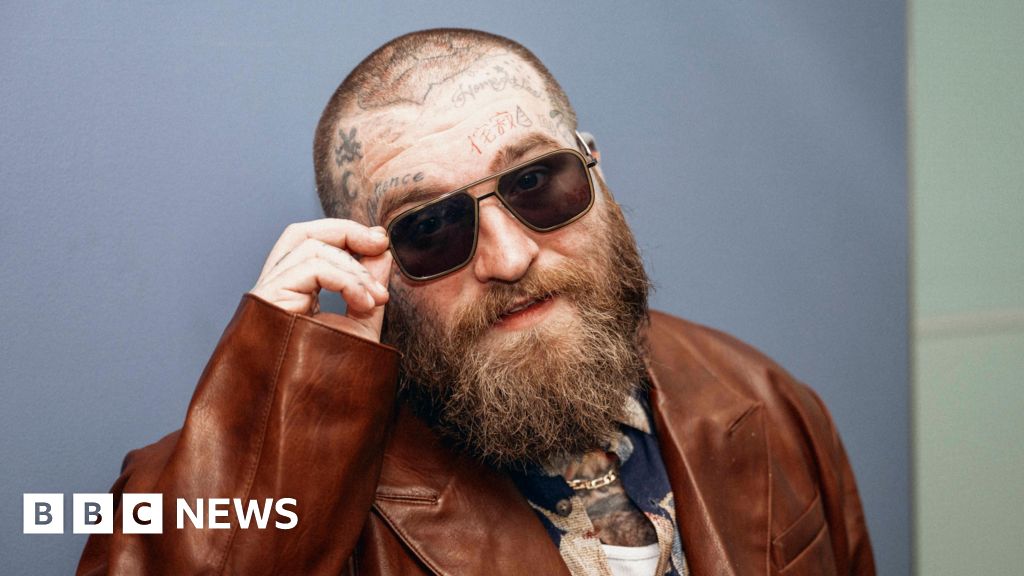ARTICLE AD BOX

By Nada Tawfik & Kayla Epstein
BBC News, New York
An adult film star. Alleged secret payments. A turncoat lawyer. And a candidate for president of the United States.
Donald Trump's very first criminal trial - and the first of a former US president - involves charges of white-collar crime, but it features some of the most eye-catching details in any of the four criminal cases against him.
The case revolves around a $130,000 (£104,000) hush money payment from Mr Trump's lawyer to adult-film actress Stormy Daniels, who claims she had an affair with Trump in 2006.
But that payment was not actually illegal. Instead, the blockbuster case bringing 34 felony charges is based on allegations the former president falsified business records to cover up the payment - made just before the 2016 election - to avoid an embarrassing sex scandal which he denies.
The trial, which starts in New York on Monday, has legal experts divided on the strength of the case. Some debate whether Manhattan's District Attorney Alvin Bragg, a Democrat, should have even brought the case and whether it is strong enough.
Ambrosio Rodriguez, a former prosecutor who says he is no fan of the former president, believes the case legitimises Mr Trump's ongoing argument that he is being prosecuted unfairly because of who he is.
Mr Rodriguez argues that the case relies on old allegations, noting that federal prosecutors had investigated and declined to bring charges.
"This is a waste of time and a bad idea, and not good for the country," he told the BBC. "This seems just a political need and want to get Trump no matter what the costs are."
Others disagree. Nick Akerman, who worked on the Watergate prosecution, says it's a serious case.
"This is about an effort to defraud the American voters in 2016 to keep them from learning material information that would have affected their vote," he told the BBC, referring to Mr Trump's alleged efforts to hide payments reimbursing his then lawyer, Michael Cohen.
A novel legal approach
The case also has come under scrutiny because it's seemingly built on an untested legal theory.
Mr Trump faces 34 felony counts of falsifying business records. New York prosecutors say Mr Cohen paid off Ms Daniels, and accuse Mr Trump of trying to disguise the money he paid him back as legal fees.
Ordinarily, falsifying business records is considered a misdemeanour - or low-level offence - in New York. But when it is done to conceal a crime, it can be elevated to a more serious felony charge.
It is not unusual for the Manhattan District Attorney's Office to do that, but Mr Bragg's approach is a particularly novel one.
Image source, Bloomberg
Image caption,Manhattan District Attorney Alvin Bragg
He says Trump Organization records were falsified to conceal or aid criminal activity. But even though the trial begins on Monday, he has not specified the exact crime allegedly hidden.
He has however given clues. In court filings and interviews, Mr Bragg has said Mr Trump violated both state and federal election laws, and state tax laws.
"The District Attorney's office is not precluded from presenting to the jury a variety of alternative theories on sort of why the records were falsified," says Shane T. Stansbury, a former assistant United States Attorney in New York's southern district.
But he adds that it is unclear if a state prosecutor can invoke a federal election crime, as it appears Mr Bragg intends to do.
"We could have federal courts and even the US Supreme Court weighing in on some of the federal questions that are part of this theory, so I think we're a long way from having resolution on this case," he says.
A former prosecutor in the New York federal office, Mark Pomerantz, said federal prosecutors went back and forth on charging Mr Trump so often that the investigation was nicknamed "the zombie case".
But due to the seriousness of charging a former president, some legal experts say that Mr Bragg had to bring the strongest possible case against Mr Trump, which is why he went for felony charges.
"Given who the defendant is in this case," said Anna Cominsky, a professor at the New York Law School, "Just a misdemeanour may not rise to the level of criminality that perhaps one would expect someone in Trump's position to be charged with."
A wildcard witness
One of the biggest wildcards in this case is the prosecution's star witness: Michael Cohen.
Cohen pleaded guilty in 2018 to federal campaign violations as part of the alleged cover-up, which he said was directed by Mr Trump.
Since his release, he has become one of Mr Trump's harshest critics, consistently attacking him in the press and on his podcast. He has also admitted in the past to lying to Congress under oath. That history makes him a "compromised witness," said Mr Stansbury.
But as the man at the centre of the alleged scheme, he is almost guaranteed to testify against his former boss.
"His credibility is a huge issue for the prosecution, and definitely something the defence is going to attack," said Ms Cominsky.
Mr Bragg will try to bolster Mr Cohen's testimony by presenting proof of the payments to the jury.
Trump's defence
The former president is sticking with a strategy that amounts to attack-and-delay. He frequently calls the case a "hoax" and a "witch-hunt."
He has slammed Judge Merchan and District Attorney Bragg and attacked their family members on social media - to the extent that a partial gag order has now been imposed that prevents him from attacking court staff and their families.
Image source, Pool/Getty Images
Image caption,Mr Trump speaks to the press after a 25 March hearing in his New York criminal case
His lawyers have tried to argue that the payments were made to keep the embarrassing information from Mr Trump's family, rather than to hide anything from voters.
Mr Akerman believes that argument, if used by the former president's lawyers in court, would fall flat with the 12-person jury ultimately deciding Mr Trump's fate.
"First of all, all of this was done right before the election, it had nothing to do with his family," he told the BBC.
Should a jury vote to convict him, Mr Trump would enter the final stretch before November's presidential election as a convicted felon.
But his legal team only needs to persuade one juror that he is not guilty of the crimes alleged for him to walk free.
"To me, the only defence that they have is to try and pick a jury and try and identify somebody who might actually hang the jury," Mr Akerman said. "Try and find someone who is a little bit eccentric, somebody who might be more sympathetic to Donald Trump."

 9 months ago
445
9 months ago
445








 English (US) ·
English (US) ·